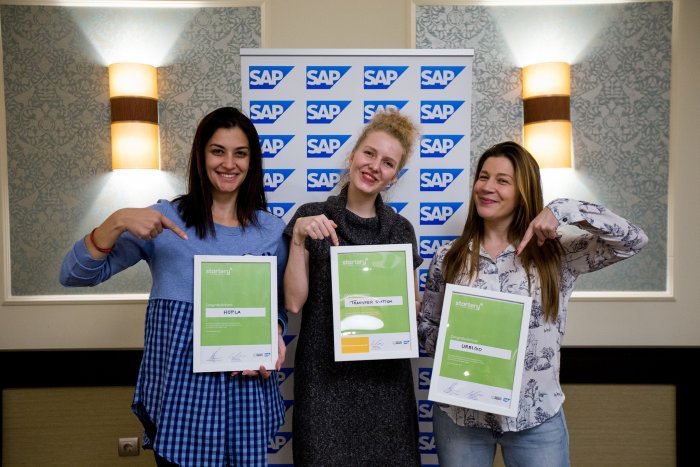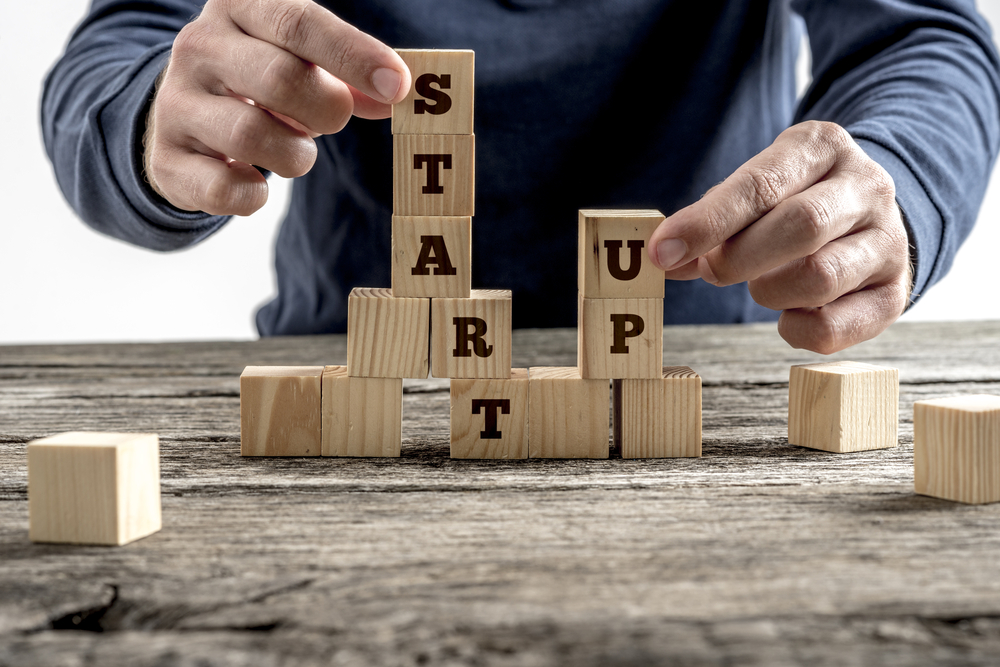CEE social startups on the way to European fame

SAP
A new breed of startups is striving to combine serving the greater good with making profits. An alliance of SAP and German agency Social Impact provides a program to catapult the best candidates from the region on to success.
Winning trio: HOPLA (Albania) recycles clothes to support those in need; Transfer Station (Czech Republic) operates a charity store by employing homeless people on a part-time basis; while UrbiGo (Serbia) aims to make the home-growing of vegetables and fruit in urban environments widespread with a smart tech, high design wall planter.
Creative chaos is what awaits you at SAP’s state-of-the-art headquarters in Budapest, Hungary. But you would expect nothing less of an event gathering startup founders. Buzz words scribbled on post-its, marker boards and flip charts dominate the interior landscape, with deeply concentrated people immersed in passionate discussions all over the place. A small group is rehearsing their pitch in one room, somebody’s giving an interview in front of a camera in the hallway, and others are hunched over their laptops in the booths of the trendy kitchen area.
This is what a standard day of “Startery” looks like, a joint scholarship and development program run by software giant SAP and Social Impact, a German agency dedicated to social innovation. Startery, which has been in operation since 2015 in the region, aims to support social startups by equipping young entrepreneurs with the skills they need to turn their social mission into a social business.
This year’s Central and Eastern European edition of Startery welcomed 25 representatives of startups with a social agenda from eight countries across the region who had gained the privilege of attending the five-day Budapest Summit in mid-November through public online voting and professional selection.

Participants dived into four days of training, focusing on the essential methods of Design Thinking and Business Model Generation, as well as marketing and sales advice, which prepared them for the final showdown, that is pitching day.
As Norbert Kunz, CEO of Social Impact explained, founders need to understand that, just because their idea serves a noble cause doesn’t mean it will necessarily sell. There is always a special angle needed that convinces customers to open their wallets.
“The recession revealed that the government doesn’t have the right mechanisms to address certain social challenges that are caused by digitalization, globalization and demographics. Healthcare and pension schemes are simply not designed to handle them all,” he explains. Therefore, it became clear that in the case of such social matters, new concepts are needed where funding comes partly from the market, partly in the form of grants.
Actually, the first practical manifestation of the model came about in the United Kingdom, with the British government having outsourced a number of government services to social startups. Along similar lines, Germany followed suit, and now has the biggest social business network in Europe.
“In the past four years, 370 teams have benefited from grants and 2,500 jobs have been created,” says Kunz. “Ordinary business counseling rules won’t apply here, though, since the circumstances are more complex. Tailor-made mentoring and supervision are, in turn, especially in need.”
In the footsteps of the SAP founders
“Social startups identify subjects there may be a market for, maybe not tomorrow, but the day after tomorrow. So, they function as a trend barometer in a way,” adds head of CSR MEE at SAP, Gabriele Hartmann. As she highlights, SAP staff are greatly involved in providing social startup founders with key skills, with more than 250 volunteering mentors and 35 workshop trainers.
“SAP prides itself on backing the Startery initiative since entrepreneurship has been valued by our company ever since its foundation back in 1972,” notes Hartmann. “In fact, SAP was set up by five young people in their early 30s, despite all the discouragement they faced. They managed to prevail because they believed hard in their idea.” This entrepreneurial spirit lives on, and now SAP has around 90,000 employees worldwide.
“Be brave, believe in your ideas, that is the legacy SAP stands for,” explains Hartmann. “One of our core strengths is how to run businesses, and that is the mission we are dedicated to accomplish by supporting Startery with our resources.”
The Budapest Summit is no exception. Trainers from Germany, Hungary and the United States educated startups for four full days. What might be a bit surprising, though, is that this time people of all age groups were represented among the participants. Artan Xërxa, who is originally from Kosovo, is one of those “veterans.”
“I train startups myself and I help them find their way through mentorship programs. However, there is always something new to learn, that is what I’m here for,” he says of his motives.
“Our aim is to help people find where they belong in the digital era and there are many ways of making it happen,” Hartmann says of SAP’s mission. “We are involved in education by teaching adolescents how to code, for instance. The other focus area we’re active in is social entrepreneurship; however, in that case we team up with partners like Social Impact that have in-depth knowledge of the area concerned.”
Winners are Berlin-bound
“Founders should explore the market to the largest possible extent, and every concern regarding the viability of their idea must be taken seriously,” highlights Kunz. “They want to come up with something very innovative, but that’s when they need to ask themselves: why doesn’t such a thing exist yet? There must be a reason for it, and it may be because there is no demand for it at all, or somebody has tried to make it work before, but they failed.”
Such advice comes in handy for the three social startups that were voted best by the jury (which included Budapest Business Journal editor-in-chief Robin Marshall) on the closing day of the Budapest Summit. From the 25 participants, only representatives of the top ten projects had the chance to present their ideas.
In the end, the three winners all turned out to be startups run by women. HOPLA (Albania) recycles clothes to support those in need; UrbiGo (Serbia) aims to make the home-growing of vegetables and fruit in urban environments widespread with a smart tech, high-design wall planter, whereas Transfer Station (Czech Republic) operates a charity store by employing homeless people on a part-time basis.
The three teams can now start the countdown to the study tour to the Berlin Lab, where a lot more mentoring and workshops await them, and where they will also have the opportunity to impress investors in person.
SUPPORT THE BUDAPEST BUSINESS JOURNAL
Producing journalism that is worthy of the name is a costly business. For 27 years, the publishers, editors and reporters of the Budapest Business Journal have striven to bring you business news that works, information that you can trust, that is factual, accurate and presented without fear or favor.
Newspaper organizations across the globe have struggled to find a business model that allows them to continue to excel, without compromising their ability to perform. Most recently, some have experimented with the idea of involving their most important stakeholders, their readers.
We would like to offer that same opportunity to our readers. We would like to invite you to help us deliver the quality business journalism you require. Hit our Support the BBJ button and you can choose the how much and how often you send us your contributions.








